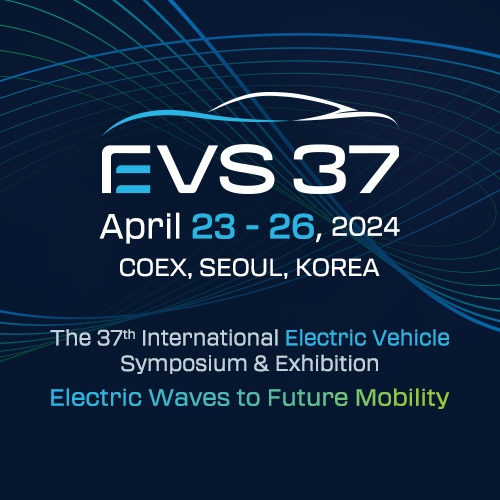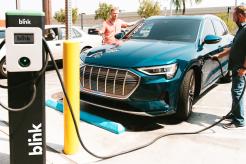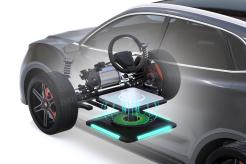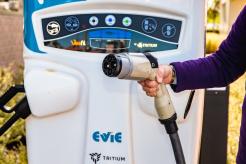Artificial intelligence (AI) may be the most significant technological advancement of the current decade. We’ve used AI to revolutionize almost every industry, from healthcare and finance to transportation and energy. EV charging is no exception; AI will play a major role in the rapid growth, efficiency, safety, and reliability of EV charging networks over the next few years.
From smart charging to automated payment, AI is poised to drive the next generation of EV charging. So, let’s break down some ways AI will transform the EV charging industry.
1. Predict User Charging Behavior

(Photo by dcbel)
Electric vehicle owners have unique charging patterns and preferences, and AI can predict them using a machine learning algorithm, allowing personalized charging recommendations and incentives.
AI can then make accurate predictions about future user charging behavior, helping charging station operators optimize their resources. Scheduling charging times and managing energy usage provides a better user experience while maximizing profits. By anticipating user charging needs, they can ensure that charging stations are available when and where they are needed most.
2. Optimize Charging Schedules and Provide Dynamic Pricing
Maximizing the efficiency of charging schedules is crucial for ensuring a steady and reliable supply of electricity, and AI has emerged as a powerful tool to achieve this goal. AI can analyze real-time power system conditions using advanced algorithms to identify the most efficient charging schedules.
In addition to these algorithms, AI can optimize charging schedules based on various factors, such as time-of-use tariffs, which adjust energy prices based on the availability of electricity. Charging can occur during off-peak hours when electricity prices are lower or abundant renewable energy is available.
The cost of charging an electric vehicle can vary depending on several factors, such as the time of day, the location, and the energy required. AI can be an excellent tool to provide dynamic pricing for charging services. By analyzing real-time power system conditions, AI can determine the most cost-effective times to charge and adjust the pricing accordingly.
3. Lead Battery Development and Testing
AI and machine learning are also revolutionizing the way we evaluate battery performance. These technologies can significantly reduce the time and number of trials required to test a battery from almost two years to 16 days.
With AI, innovators can also optimize every aspect of the battery development pipeline, from designing the battery’s chemistry, size, and shape to finding better systems for manufacturing and storage. By quickly identifying the most promising approaches and eliminating unnecessary experiments, AI can help us save time and resources.
Furthermore, AI can find patterns in early data that indicate how long batteries will last, helping us to optimize cycling experiments and test protocols. AI can also assist in extracting knowledge that humans cannot, further accelerating the battery development process.
4. Location Selection and Charger Deployment
AI can completely revolutionize the deployment of electric vehicle chargers in several ways. Through the analysis of data from various sources, such as traffic patterns, population density, current EV charging infrastructure, and forecasted EV adoption rates, AI can identify the most advantageous locations for EV charging stations. By utilizing AI to optimize charger placement, transportation planners can mitigate the expenses associated with installation and maintenance.
AI can also facilitate optimizing energy usage by constantly monitoring electricity demand and ensuring that we use EV charging stations efficiently. This has the potential to minimize energy waste and avert overloading of the power grid during periods of peak usage.
5. Optimize Vehicle-To-Grid (V2G) Services

(Photo by Pixabay)
Integrating renewable energy into the transportation and electricity sectors is indispensable for promoting a sustainable energy future. V2G (vehicle-to-grid) technology is a promising solution that allows EVs to discharge their stored energy back into the grid during high-demand periods.
AI can play a pivotal role in coordinating vehicle-to-grid (V2G) services with energy trading to ensure the efficient utilization of resources. In this scenario, AI functions as a supercomputer, responding instantaneously to determine the most opportune moments for V2G use.
AI also optimizes the pricing of V2G services and curbs emissions. This tactic can prove advantageous to EV owners, who can earn additional income by returning their surplus energy to the grid.
6. Impact the Operations of Self-Driving EVs
AI has revolutionized the way self-driving cars operate. AI allows these cars to learn deeply, use computer vision, and leverage parallel computing algorithms to make decisions. With AI, self-driving cars can perform sensory, cognitive, and executive functions that were once reserved only for human drivers. Though these innovations can affect all self-driving vehicle companies equally, forward-thinking EV makers are especially well-positioned to take advantage of AI’s myriad capabilities.
Are you interested in learning more about EV Charging and emerging technologies? Join us at the upcoming EV Charging Summit & Expo!






